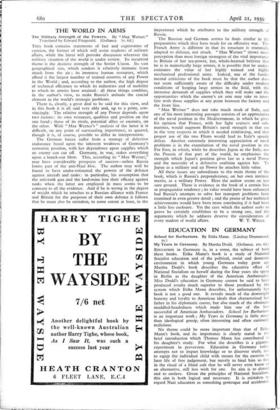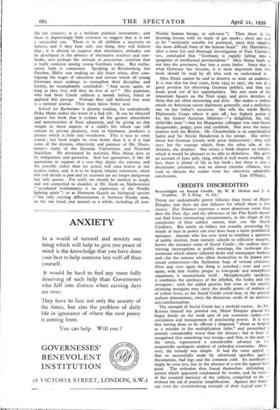EDUCATION IN GERMANY
My Years in Germany. By Martha Dodd. (Gollancz. ios. 6d.) EDUCATION in Germany is, in a sense, the subject of both these books. Erika Mann's book is a study of National Socialist education and of the political, social and domestic environment in which young Germans today grow up. Martha Dodd's book describes the educative effect of National Socialism on herself during the four years she spent in Berlin as the daughter of the American Ambassador. Miss Dodd's education in Germany cannot be said to have produced results much superior to those produced by the system which Erika Mann describes, for unfortunately her book is not a good one. It reveals much of the downright honesty and loyalty to American ideals that characterised her father in his diplomatic career, but also much of the obstinate muddled-headedness which made him one of the less successful of American Ambassadors. School for Barbarians is an important work ; My Years in Germany is little more than ideological gossip, often interesting and often curiously malicious.
No theme could be more important than that of Erika Mann's book, and its importance is dearly stated in the brief introduction which Thomas Mann has contributed to his daughter's study. For what she describes is a gigantic experiment in perversion. Education in Germany today attempts not to impart knowledge or to discover truth, not to equip the individual child with means for the exercise in later life of free judgement, but merely to bind him so fast in the ritual of a blind cult that he will never even know of an alternative, still less wish for one. Its aim is to distort and to enslave. Given the principles of National Socialism, this aim is both logical and necessary. It is mistaken to regard Nazi education as something grotesque and accidental.
On the contrary, it is a brilliant political instrument ; and there is depressingly little evidence to suggest that it is not a successful one. There is in all children a necessity to believe, and if they hear only one thing, they will believe that ; it is absurd to suppose that alternative attitudes can be developed in the absence of alternative teachers and text- books, save perhaps the attitude of precocious cynicism that is fairly common among young Germans today. But enthu- siastic faith is commoner. Speaking in Reichenberg last October, Hitler was making no idle boast when, after cata- loguing the stages of education and service which all young Germans must undergo to strengthen their discipline and loyalty, he triumphantly conduded : "And never again, so long as they live, will they be free of us ! " His audience, who had been Czech subjects a month before, failed to applaud thrs passage. Perhaps they still believed that man is a rational animal. They must know better now.
School for Barbarians is gloomy reading; for undoubtedly Erika Mann makes the worst of a bad job. It can be objected against her book that it isolates all the greater absurdities and monstrosities of Nazi education, and by giving no due weight to those aspects of a child's life which can still remain its private property, even in Germany, produces a picture which is false and overdrawn. This is true to some extent ; her book might be even better than it is if it had some of the dryness, objectivity and patience of Mr. Harts- home's study of the German Universities and National Socialism. He devastated by statistics, Miss Mann does so by indignation and quotation. And her quotations, if like all quotations in support of a case they depict the extreme and the possible rather than the actual, will raise horror in her readers today, and, it is to be hoped, hilarity tomorrow, when this evil dream is past and its excesses are no longer dangerous but only quaint. For really we should be entitled to laugh, and not compelled to shudder, at Dr. Geck on Mathematics (" occidental mathematics is an expression of the Nordic fighting spirit ") or at Hermann Gauch on biological species (" the only existing differentiation is between Nordic man, on the one hand, and animals as a whole, including all non-
Nordic human beings, or sub-men "). Then there is the drawing lesson, with its study of gas masks ; these are said to be "eminently suitable for portrayal, since they simplify the more difficult form of the human head." Mr. Hartshorne, after a most fair and thorough investigation of Nazi Universi- ties, concluded that "Germany is rapidly falling into a quagmire of intellectual provincialism." Miss Mann leads us not into the provinces, but into a crazy limbo. Since that is what Germany has become, it is most important that this book should be read by all who seek to understand it.
Miss Dodd cannot be said to deserve so wide an audience. It is true that for four years, from 1933 to 1937, she was in a good position for observing German politics, and that she made good use of her opportunities. She met most of the important figures on the Nazi stage, and gives sketches of them that are often interesting and alive. She makes a violent attack on American career diplomats generally, and a malicious one on her father's successor. She tells the whole Berlin Diplomatic Corps where it gets off ; her highest praise is for the former Austrian Minister—" a delightful, fat, tall, child-like man "—but his Hungarian colleague was sour-faced, disagreeable, podgy, poor and snobbish. Nor does she mince matters with the British : Mr. Chamberlain is an unprincipled Judas and Sir Nevile Henderson is his stooge. She writes about her German friends with great indiscretion ; they will envy her the courage which, from the other side of the Atlantic, she displays. She writes a brisk chapter on torture, which it would be pleasant to be able to disbelieve. She gives an account of June 30th, 1934, which is well worth reading. In fact, there is plenty of life in her book ; but there is also a doctrinaire petulance, and an almost extreme silliness, that tend to alienate the reader from her otherwise admirable











































 Previous page
Previous page